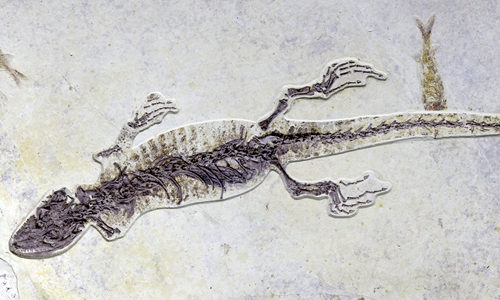


A lizard fossil contains crayfish remains in its stomach. Photo: Courtesy of Xing Lida
BEIJING, Nov. 19 (Xinhua) -- Researchers from China University of Geosciences announced Tuesday that they have discovered a fossil of an extinct genus of lizard dating back about 100 million years in northeast China.
Led by Xing Lida, an associate professor with China University of Geosciences, the excavation of the Yabeinosaurus was co-conducted by academics from Yingliang Stone Nature History Museum and University College London, in Jianchang County in northeast China's Liaoning Province.
The specimen measures 22 centimeters in length from its nose to hips.
Different from previous discoveries in the same area, researchers found remains of a large crawfish in the lizard's stomach, including cheliped, a broken pereiopod and tentacles, which look like today's crawfish.
Although the Yabeinosaurus lacked obvious morphological aquatic features, it had a habit of hunting on riverbanks, according to Xing.
Researchers said the discovery is of great significance for studying small and medium-sized reptiles' predation habits in the Cretaceous period.
The discovery was published on the online version of the journal Cretaceous Research.
Yabeinosaurus, discovered in 1942, is a common saurian fossil in Jehol Biota of northeastern Liaoning Province.

 Award-winning photos show poverty reduction achievements in NE China's Jilin province
Award-winning photos show poverty reduction achievements in NE China's Jilin province People dance to greet advent of New Year in Ameiqituo Town, Guizhou
People dance to greet advent of New Year in Ameiqituo Town, Guizhou Fire brigade in Shanghai holds group wedding
Fire brigade in Shanghai holds group wedding Tourists enjoy ice sculptures in Datan Town, north China
Tourists enjoy ice sculptures in Datan Town, north China Sunset scenery of Dayan Pagoda in Xi'an
Sunset scenery of Dayan Pagoda in Xi'an Tourists have fun at scenic spot in Nanlong Town, NW China
Tourists have fun at scenic spot in Nanlong Town, NW China Harbin attracts tourists by making best use of ice in winter
Harbin attracts tourists by making best use of ice in winter In pics: FIS Alpine Ski Women's World Cup Slalom
In pics: FIS Alpine Ski Women's World Cup Slalom Black-necked cranes rest at reservoir in Lhunzhub County, Lhasa
Black-necked cranes rest at reservoir in Lhunzhub County, Lhasa China's FAST telescope will be available to foreign scientists in April
China's FAST telescope will be available to foreign scientists in April